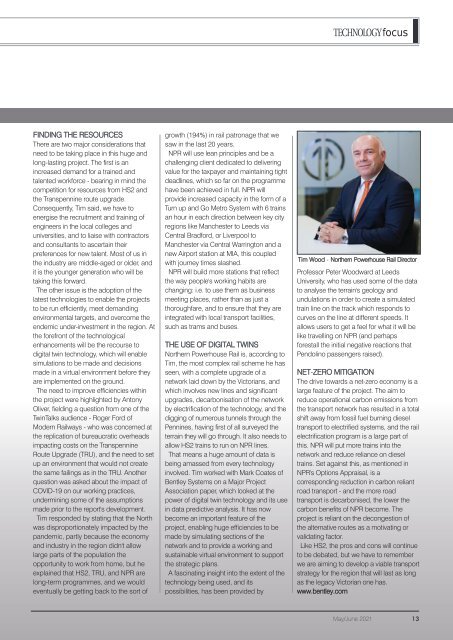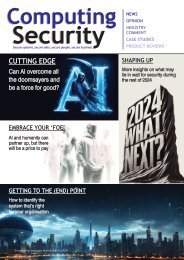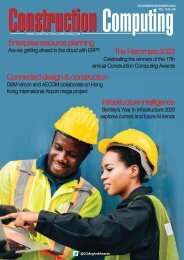CU2105
You also want an ePaper? Increase the reach of your titles
YUMPU automatically turns print PDFs into web optimized ePapers that Google loves.
TECHNOLOGYfocus<br />
FINDING THE RESOURCES<br />
There are two major considerations that<br />
need to be taking place in this huge and<br />
long-lasting project. The first is an<br />
increased demand for a trained and<br />
talented workforce - bearing in mind the<br />
competition for resources from HS2 and<br />
the Transpennine route upgrade.<br />
Consequently, Tim said, we have to<br />
energise the recruitment and training of<br />
engineers in the local colleges and<br />
universities, and to liaise with contractors<br />
and consultants to ascertain their<br />
preferences for new talent. Most of us in<br />
the industry are middle-aged or older, and<br />
it is the younger generation who will be<br />
taking this forward.<br />
The other issue is the adoption of the<br />
latest technologies to enable the projects<br />
to be run efficiently, meet demanding<br />
environmental targets, and overcome the<br />
endemic under-investment in the region. At<br />
the forefront of the technological<br />
enhancements will be the recourse to<br />
digital twin technology, which will enable<br />
simulations to be made and decisions<br />
made in a virtual environment before they<br />
are implemented on the ground.<br />
The need to improve efficiencies within<br />
the project were highlighted by Antony<br />
Oliver, fielding a question from one of the<br />
TwinTalks audience - Roger Ford of<br />
Modern Railways - who was concerned at<br />
the replication of bureaucratic overheads<br />
impacting costs on the Transpennine<br />
Route Upgrade (TRU), and the need to set<br />
up an environment that would not create<br />
the same failings as in the TRU. Another<br />
question was asked about the impact of<br />
COVID-19 on our working practices,<br />
undermining some of the assumptions<br />
made prior to the report's development.<br />
Tim responded by stating that the North<br />
was disproportionately impacted by the<br />
pandemic, partly because the economy<br />
and industry in the region didn't allow<br />
large parts of the population the<br />
opportunity to work from home, but he<br />
explained that HS2, TRU, and NPR are<br />
long-term programmes, and we would<br />
eventually be getting back to the sort of<br />
growth (194%) in rail patronage that we<br />
saw in the last 20 years.<br />
NPR will use lean principles and be a<br />
challenging client dedicated to delivering<br />
value for the taxpayer and maintaining tight<br />
deadlines, which so far on the programme<br />
have been achieved in full. NPR will<br />
provide increased capacity in the form of a<br />
Turn up and Go Metro System with 6 trains<br />
an hour in each direction between key city<br />
regions like Manchester to Leeds via<br />
Central Bradford, or Liverpool to<br />
Manchester via Central Warrington and a<br />
new Airport station at MIA, this coupled<br />
with journey times slashed.<br />
NPR will build more stations that reflect<br />
the way people's working habits are<br />
changing: i.e. to use them as business<br />
meeting places, rather than as just a<br />
thoroughfare, and to ensure that they are<br />
integrated with local transport facilities,<br />
such as trams and buses.<br />
THE USE OF DIGITAL TWINS<br />
Northern Powerhouse Rail is, according to<br />
Tim, the most complex rail scheme he has<br />
seen, with a complete upgrade of a<br />
network laid down by the Victorians, and<br />
which involves new lines and significant<br />
upgrades, decarbonisation of the network<br />
by electrification of the technology, and the<br />
digging of numerous tunnels through the<br />
Pennines, having first of all surveyed the<br />
terrain they will go through. It also needs to<br />
allow HS2 trains to run on NPR lines.<br />
That means a huge amount of data is<br />
being amassed from every technology<br />
involved. Tim worked with Mark Coates of<br />
Bentley Systems on a Major Project<br />
Association paper, which looked at the<br />
power of digital twin technology and its use<br />
in data predictive analysis. It has now<br />
become an important feature of the<br />
project, enabling huge efficiencies to be<br />
made by simulating sections of the<br />
network and to provide a working and<br />
sustainable virtual environment to support<br />
the strategic plans.<br />
A fascinating insight into the extent of the<br />
technology being used, and its<br />
possibilities, has been provided by<br />
Tim Wood - Northern Powerhouse Rail Director<br />
Professor Peter Woodward at Leeds<br />
University, who has used some of the data<br />
to analyse the terrain's geology and<br />
undulations in order to create a simulated<br />
train line on the track which responds to<br />
curves on the line at different speeds. It<br />
allows users to get a feel for what it will be<br />
like travelling on NPR (and perhaps<br />
forestall the initial negative reactions that<br />
Pendolino passengers raised).<br />
NET-ZERO MITIGATION<br />
The drive towards a net-zero economy is a<br />
large feature of the project. The aim to<br />
reduce operational carbon emissions from<br />
the transport network has resulted in a total<br />
shift away from fossil fuel burning diesel<br />
transport to electrified systems, and the rail<br />
electrification program is a large part of<br />
this. NPR will put more trains into the<br />
network and reduce reliance on diesel<br />
trains. Set against this, as mentioned in<br />
NPR's Options Appraisal, is a<br />
corresponding reduction in carbon reliant<br />
road transport - and the more road<br />
transport is decarbonised, the lower the<br />
carbon benefits of NPR become. The<br />
project is reliant on the decongestion of<br />
the alternative routes as a motivating or<br />
validating factor.<br />
Like HS2, the pros and cons will continue<br />
to be debated, but we have to remember<br />
we are aiming to develop a viable transport<br />
strategy for the region that will last as long<br />
as the legacy Victorian one has.<br />
www.bentley.com<br />
May/June 2021 13

















